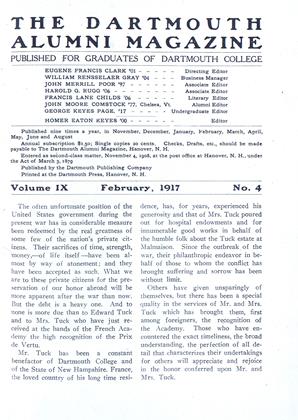during the present war has in considerable measure been redeemed by the real greatness of some few of the nation's private citizens. Their sacrifices of time, strength, money,.— of life itself — have been almost byway of atonement; and they have been accepted as such. What we are to these private citizens for the preservation of our honor abroad will be more apparent after the war than now. But the debt is a heavy one. And to none is more due than to Edward Tuck and to Mrs. Tuck who have just received at the hands of the French Academy the high recognition of the Prix de Vertu.
Mr. Tuck has been a constant benefactor of Dartmouth College and of the State of New Hampshire. France, the loved country of his long time residence, has, for years, experienced his generosity and that of Mrs. Tuck poured out for hospital endowments and for innumerable good works in behalf of the humble folk about the Tuck estate at Malmaison. Since the outbreak ,of the war, their philanthropic endeavor in behalf of those to whom the conflict has brought suffering and sorrow has been without limit.
Others have given unsparingly of themselves, but there has been a special quality in the services of Mr. and Mrs. Tuck which has brought them, first among foreigners, the recognition of the Academy. Those who have en- countered the exact timeliness, the broad understanding, the perfection of all detail that characterizes their undertakings for others will appreciate and rejoice in the honor conferred upon Mr. and Mrs. Tuck.
The Rockefeller General Education Board has just completed arrangements with the Teachers College of Columbia University for the introduction of curricula and instruction methods which are calculated if successful to change the face of American education. That, at least, is the impression to be gained from the newspapers. To reach a just estimate of the value of the proposed experiment will, however, be difficult enough soon after the experiment has passed out of the stage of nebulous proposal into that of actual operation.
The American tendency is usually to try out political and educational panaceas on so large a scale that a generation or more may suffer before the bad effects can be eliminated and the good have opportunity to manifest themselves. It is fair to assume that the Education Board purposes to investigate, through actual tests, the validity of certain theories, and to keep the field of observation as limited as the nature of the investigation will allow. The fact that this can be done without upsetting or disarranging the present machinery of public education, commends its private auspices.
Presumably the end of public education is citizenship. The individual should contribute his share to the economic development of the state. In so doing he will himself materially benefit. His training for this should be in the line of his best ability and should of necessity be vocationalized or individualized: the terms mean much the same thing in this connection. But beyond and above his economic responsibilities, the individual has social responsibilities to the state as a complex of the human beings more or Jess like himself. Training for an appreciation of these must be general and for the purpose of producing similarity of ideals in the entire group.
To over emphasize either aspect of the training of the future citizen is to warp the educational process. How the coldly scientific method that seems fundamental to the General Education Board procedure will avoid warping constitutes for the outsider one of the most interesting aspects of the experiment.
The death on December 30, of Dr. George Clary removes the last member of the class of 1852. Dr. Clary, long the only survivor of his class was among the most enthusiastic of alumni old or young. Five years since he was present at Commencement. Of classes earlier than his only four are represented by living graduates: 1851 by one man, John Pierce Sabin of Roland Park, Maryland ; 1850 by Samuel L. Roberts of Wakefield, N. H. The class of 1849 boasts two alumni, Joseph W. P. Carter whose address is unknown, and John P. Newell of Hudson, N. H. There is a gap of three years without representatives until in the Class of 1846 we find Dr. Josiah W. Barstow who dwells in serene and well busied old age in New York City.
 View Full Issue
View Full Issue
More From This Issue
-
 Article
ArticleTHE SCHOOL AND COLLEGE LIFE OF JUDAH DANA OF THE CLASS OF 1795
February 1917 By James A. Spalding '66 -
 Books
BooksThe New Reservation of Time
February 1917 By HENRY T. MOORE -
 Class Notes
Class NotesCLASS OF 1916
February 1917 By Richard Parkhurst -
 Article
ArticleTRUSTEE EDWARD K. HALL TO LEAVE NEW ENGLAND
February 1917 -
 Class Notes
Class NotesCHICAGO ASSOCIATION
February 1917 By T.T. REDINGTON '07, CHARLES R. WEBSTER '82, CHANCELLOR L. JENKS '861 more ... -
 Article
ArticleVARSITY BASKETBALL
February 1917
Article
-
 Article
ArticleMasthead
JUNE, 1907 -
 Article
Article$1,200,000 Bequest
March 1941 -
 Article
Article12 Alumni Dinners Listed for March
March 1950 -
 Article
ArticleThe Undergraduate Chair
MARCH 1973 By BRUCE KIMBALL '73 -
 Article
ArticleTHE DARTMOUTH RECORD
December 1950 By Cleveland Plain Dealer -
 Article
ArticleThe Green: A House Mover and an ex-President Proved Who Owns It (Didn't They?)
May 1976 By Jabberwocky, Lewis Carroll, JAMES L. FARLEY '42


